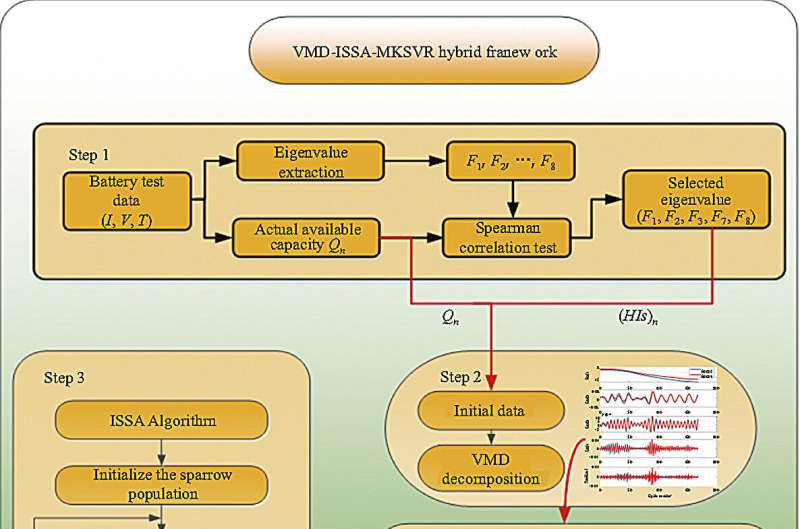This article has been reviewed according to Science X's editorial process and policies. Editors have highlighted the following attributes while ensuring the content's credibility:
fact-checked
proofread
A hybrid data-driven framework considering feature extraction for battery state of health estimation and life prediction

A paper proposing a hybrid data-driven framework considering feature extraction for battery state of health estimation and remaining useful life prediction was published in Green Energy and Intelligent Transportation.
VMD is used for completely non-recursive modal variation to deal with signals. The optimal solution of the variational problem is obtained finally by the effective decomposition component of the given signal. By iteration, the VMD algorithm can decompose the signals into some intrinsic mode functions (IMFs) and a relevant residual value containing multiple different frequency scales.
The SVM algorithm based on the statistical learning theory was proposed by Vapnik mainly used for pattern recognition and classification. Based on the VC dimension theory, SVM obtains the global optimal solution. To reduce the parameter dimension, the optimization process is simplified by introducing the kernel function. When used as a regression tool, SVM implements a variant of the algorithm called SVR.
The SSA algorithm is a new type of swarm intelligence optimization algorithm, and its basic structure is similar to the ABC algorithm except for the search operator. In this paper, it is used to optimize penalty constant C and Kernel function parameter σ to realize the accurate prediction of the MKSVM model.
The elite chaotic opposition-learning method is adopted to generate an initial population to enhance its quality and diversity. By selecting elite individuals on a larger scale, the algorithm can improve the local escape ability and convergence performance, then lead to a more accurate solution. In this paper, the chaotic skew tent map is chosen to generate the initial population to enhance the stability of the initial individuals due to its characteristic of randomness and ergodicity.
Since the update weight is large and not changed much during iteration, it may miss the global optimum. Adaptive weights are introduced to improve the performance of the SSA algorithm to find the global optimum.
In this study, researchers present a hybrid framework considering feature extraction for a better performance of battery SOH estimation and RUL prediction. The hybrid framework combines VMD, an improved sparrow search algorithm (ISSA), and a multi-kernel support vector regression (MKSVR) model. The contributions are summarized. First, eight features are obtained to be fed into the life prediction model by feature extraction.
Secondly, the VMD method is applied to decompose the original data to make the capacity data more stable. Then, an elite chaotic opposition-learning strategy and adaptive weights are adopted to optimize the traditional sparrow search algorithm (SSA) to obtain more accurate parameters of the prediction model. Finally, MKSVR is used to solve the low prediction accuracy problem caused by large sample data and uneven distribution of high-dimensional feature space.
Datasets from the National Aeronautics and Space Administration are applied for experimental verification. The RUL predictions with different start points are conducted to verify the stability of the VMD-ISSA-MKSVR framework. By comparison with IPSO-SVR, ISSA-SVR, BL-ELM, and VMD-ISSA-SVR, it can be verified that the errors of SOH estimation and RUL prediction obtained by the VMD-ISSA-MKSVR framework are the smallest. It has relatively high prediction accuracy and stability.
More information: Yuan Chen et al, A hybrid data driven framework considering feature extraction for battery state of health estimation and remaining useful life prediction, Green Energy and Intelligent Transportation (2024). DOI: 10.1016/j.geits.2024.100160
















